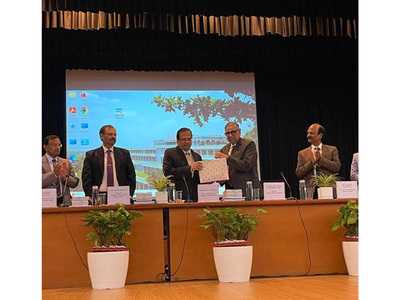Bhopal (Madhya Pradesh) [India], November 9 (ANI): The Ministry of Home Affairs and the National Judicial Academy Bhopal hosted a two-day National Conference on three New Criminal Laws in Bhopal on 8-9 November, 2025.
The conference was attended by 120 participants from all states/UTs, covering three major pillars of the criminal justice system, i.e., Judiciary, Prosecution and Police. The resource persons were drawn from academic institutions and served senior practitioners.
Addressing the two-day National Conference, Union Home Secretary Govind Mohan said that under the leadership of Prime Minister Narendra Modi, the Government of India is building a secure, transparent, and evidence-based criminal justice system.
Mohan said that under the guidance of Union Home Minister and Minister of Cooperation, Amit Shah, the country has ushered in a new era of speedy justice.
He reiterated that the new Criminal Laws aim at decolonising India's criminal justice system and making it more victim-centric and technology-enabled. He appreciated a key institutional contribution to the implementation of these laws from the National Judicial Academy, Bhopal, which has drafted model rules / standard operating procedures for key technological innovations introduced under the new framework.
These include e-Sakshya (electronic evidence), e-Summon (digital issuance and delivery of legal notices), community service (as an alternative sentencing mechanism), and Nyay Shruti (audio-visual systems for accessible justice delivery).
Union Home Secretary said technology forms the bedrock of the New Criminal Laws, which aim to ensure a faster and more efficient justice delivery system by addressing the long-standing issue of delays. The new laws introduce several provisions designed to minimise delays in investigation, trial, and other procedural stages. He said that the e-Committee of the Hon'ble Supreme Court of India has played a pivotal role in driving the technological integration necessary for the effective implementation of the new laws.
Union Home Secretary said that going forward, the focus must now shift to sustained adoption, continuous improvement, and institutionalisation of the reforms introduced under the three new criminal laws. State Governments should establish dedicated monitoring mechanisms to assess the progress of implementation, identify operational bottlenecks, and ensure timely updates of rules, notifications, and SOPs in alignment with evolving judicial and technological needs. Police departments must prioritise complete digitisation of investigation and prosecution workflows, ensuring that systems such as e-Sakshya, e-Summons and ICJS are used as the default mode of operation. (ANI)
You may also like

Is Stephen Curry playing tonight vs the Indiana Pacers? Latest update on the Golden State Warriors star's injury report (November 9, 2025)

The 10 best Christmas markets in Europe - including one of world's oldest started in 1434

F1 standings after Brazil GP as Lando Norris opens up Oscar Piastri gap

"Based on our work in the Centre, state, we'll win with landslide victory": Delhi BJP Chief on MCD bypolls

Jews, women, Brexiteers and many more have been treated with contempt by the BBC







